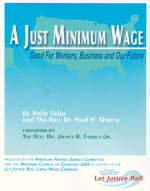Minimum wage raises have been so little, so late that even
with the increase to $7.25 on July 24, workers will still make less than the $7.93
minimum wage of 1956, adjusting for inflation. It would take $9.92 to match the buying power of the minimum wage of
1968. That's why the Let Justice Roll Living Wage Campaign says the minimum
wage raise on July 24 is good, but not good enough.
"It can get very difficult when you have to decide which bill to pay each month," says Anjail Hafeeza of New Jersey. "I'm constantly scrambling to keep from getting evicted or have the lights cut off. I'm a mother of 2 young boys, working two jobs, but one paycheck from being homeless."
The owner of The Progress Bakery in Springdale, Ark., Jose Herrera,
says, "The minimum wage increase is
a good investment. From a business owner's point of view, I think it's great
because it would help my workers and customers earn more -- bringing in more
business in the long run."
Jose
Oliva is Policy Coordinator for Restaurant Opportunities Centers (ROC) United, which has chapters
in Chicago, Los Angeles, Maine, Miami,
Michigan, New Orleans, New York and Washington, DC, where the minimum wage
is also going up because it's tied to $1 above the federal level. Oliva says, "Restaurant workers do some of the hardest and most
underappreciated jobs in our nation. It's time they were guaranteed fair
compensation. While the minimum wage increase is progress worth celebrating, we
can't forget that tipped workers are waiting for additional reforms."
Almost 15% of waiters and waitresses live below the
federal poverty level -- which is itself below the actual level needed for even
basic necessities. The minimum base pay for tipped workers has been frozen at
$2.13 since 1991. Tipped workers, such as restaurant servers, delivery workers and
others will benefit from the July 24 increase because base pay plus tips must
add up to the minimum wage or else employers must make up the difference. But too
many managers take advantage of workers by illegally underpaying them. The
$2.13 rate will not increase with the new minimum wage. To help remedy this
unfair situation, ROC-United is encouraging Congress to pass the Working for Adequate Gains for Employment
in Services "WAGES" Act (H.R. 2570). The bill would increase
tipped workers' base pay to $3.75 immediately and later index the rate to 70%
of the federal minimum wage.
In Nashville, Tenn.,
small business owners, faith leaders, minimum wage workers and living wage
advocates will hold a press conference on Friday, July 24 to celebrate the
federal increase but also emphasize that it's not enough.
Rabbi Saul Strosberg
of Congregation Sherith Israel in Nashville
will speak at Friday's press conference, saying, "When the Bible tells us to let the poor glean from the corners of
the fields, we can translate that to paying workers enough to feed their
families. The strength of our society lies in how we take care of those who
have the least. A raise in the minimum wage is in accord with our religious
values."
Maryanna
Clarke, Founding Artistic Director of the Tennessee Women's Theater Project, said, "It is important to me that artists, and all workers, make a living
wage. I don't believe in the theory of trickle down economics. If people make
enough to live on, they will put money back into the economy in the form of
purchases -- they will stimulate the economy. But beyond that -- paying workers
a living wage is the honorable thing to do!"
Let Justice Roll is calling for a minimum wage of $10 in
2010 to make up the ground lost in minimum wage buying power since 1968 and
bring us closer to the "minimum standard of living necessary for health,
efficiency and general well-being of workers" promised in the 1938 Fair
Labor Standards Act.
"The minimum
wage was enacted during the Great Depression to put a floor under workers'
wages and stimulate the economy," said Holly Sklar, Let Justice Roll Senior Policy Adviser and author of Raising
the Minimum Wage in Hard Times and Raise
the Minimum Wage to $10 in 2010. "The
fall in worker buying power is a big reason we're in the worst economic
meltdown since the Depression. You
can't build a strong economy on poverty wages."
Rev.
Paul Sherry, Executive Director of Let Justice Roll, says, "It is immoral that the minimum wage
does not cover the cost of basic human needs. We need a wage ethic to go with
our work ethic. We can start by raising the minimum wage again to $10 in 2010."
More
than 600 faith leaders from all 50 states have endorsed Let Justice
Roll's letter calling for a $10 in 2010 minimum wage, and more are signing on every
day. You can find the Faith
Leaders Letter and growing list
of signatories at our website.
With over 100 member organizations, the Let Justice Roll
Living Wage Campaign is the leading faith, community, labor, business coalition
committed to raising the minimum wage to a living wage at the state and federal
level.
###





